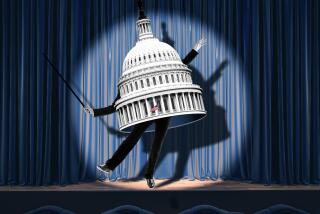Fear, Politics and Anxiety at the NEA : Arts grants: Many applicants believe the White House is pressing to pick an uncontroversial successor to John E. Frohnmayer.
By this time last year, Tom DiMaria, the executive director of San Francisco’s Frameline, knew his non-profit gay and lesbian media arts organization, which sponsors the annual International Gay and Lesbian Film Festival, would receive a $12,000 grant from the National Endowment for the Arts. The NEA has funded Frameline annually since 1988.
But last month Frameline’s 1992 grant application for $20,000 was delayed, DiMaria says, while the NEA “gathers additional information” on the grant. The application now will be reviewed in May.
The delay puts Frameline’s application in an unusual--and uncomfortable--position: It will be among the first round of requests to fall on the plate of whomever steps in as chairman of the NEA after its beleaguered current chief, John E. Frohnmayer, officially steps down May 1.
Frohnmayer’s forced resignation Feb. 21 came as President Bush’s popularity polls continued to falter, and the Bush campaign suffered attacks by conservative challenger Patrick Buchanan, who targeted Bush’s support for the NEA. The endowment, Buchanan maintains, subsidizes “filthy and blasphemous art.” Most recently, Buchanan’s TV spots for Tuesday’s Georgia primary pointed a finger at Bush for allowing federal funds to support the PBS documentary “Tongues Untied,” which explores the lives of gay black men.
DiMaria and others in the arts and politics believe those attacks, as well as continued pressure from political and religious conservatives, have led to a climate of fear at the NEA, a fear which some believe has already caused delays for some applications and rejections for others.
And avant-garde artists fear that Frohnmayer’s successor, under extreme pressure to avoid controversy, may take an even harder line against controversial grants between May 1 and the presidential election.
“I wouldn’t wish that job upon anyone,” DiMaria said. “That person is going to be under intense political pressure. I think a more conservative chairperson will be appointed, and then face a litmus test in the next round of grants.”
Julie Davis, former general counsel to the NEA, agreed. “That would certainly be my guess, and that would certainly be my fear,” she said from Oregon, where she is now practicing law. “There could be an attempt not only to squelch controversial projects from the past, but those that are deemed to be potentially controversial.”
Joy Silverman of the New York-based National Campaign for Freedom of Expression said that some artists might not want to come forward with concerns about their May applications in order to avoid “self-flagging.” And other artists believe the pressure is already on. At the same meeting where Frameline’s grant was postponed, both Santa Monica’s Highways and New York’s Franklin Furnace were denied grants that included overt sexual content; their directors believe the applications were “flagged” for special scrutiny and have demanded a thorough examination of the procedures which led to the grant denials. Frohnmayer has maintained that the NEA rejected Highways and Franklin Furnace based on artistic merit, not sexual explicitness.
DiMaria believes that Frameline and other controversial organizations could be used to score points for the Bush Administration when May comes. While hesitant to offer comment that might influence the NEA on approving Frameline’s grant, he acknowledged that “there’s a lot of political consideration being given to this grant.”
Along with Frameline, another avant-garde arts organization, New York’s Creative Time, has also had its application delayed until May because of “unclear interim reporting.”
Cee Brown, executive director of Creative Time, believes the NEA’s delay on his group’s grant had more to do with a recent barrage of press about Creative Time projects than unclear reports. Along with a pro-choice video produced for television (submitted with its application to the NEA’s visual arts program), Creative Time has created a series of bus posters which call AIDS the result of “corporate greed, government inaction and public indifference.”
Brown said the NEA requested more specific information on which projects Creative Time would fund with its grant.
Some 1,000 grants are expected to pass through the NEA for approval or rejection in May. The NEA does not release information about grants before they are approved, so targeting of applications by pressure groups before they are approved would be difficult. Many NEA opponents, including Phyllis Schlafly’s Eagle Forum, Pat Robertson’s Christian Coalition and Sen. Jesse Helms (R-N.C.), do not attempt to seek information about grant applications, but wage their war by targeting works already funded by the NEA.
Wendy Luers, a member of the NEA’s advisory body, the National Council on the Arts, acknowledged that conservatives will continue to attack the NEA until the election--and that paranoia, whether real or unfounded, will run high among the arts community during the campaign. “It’s crazy time. It’s silly season,” Luers said.
Luers said that naming a permanent successor to Frohnmayer will be a long process, since any candidate the White House selects must be approved by the Senate. As do many in the arts community, Luers believes the Bush Administration will “keep their heads down” until the election, either naming an acting chairman from within the NEA, or not name anyone at all to lead the organization until then.
But a White House official said Monday that despite the political sensitivity of the matter, the question of finding a new chairman for the NEA is “on the front burner.” Deputy press secretary Judy Smith said it was “something people are paying close attention to,” although no interviews with potential candidates have been scheduled.
Frohnmayer’s resignation has already triggered rumors about possible successors--including NEA senior deputy chairwoman Anne-Imelda Radice, as well as her predecessor, Alvin S. Felzenberg, who was fired by Frohnmayer. Felzenberg landed another Washington job with the Citizens Democracy Corps., an organization that sends volunteers to Eastern Europe, and has been chosen by Pat Robertson’s Christian Coalition as its preferred candidate.
Other names rumored for the position include: Lynne Cheney, chairwoman of the National Endowment for the Humanities; Leonard Garment, former presidential counselor to Richard Nixon and author of a recent New York Times editorial decrying NEA support for “fecal symbolism, public urination and the politics of contempt”; Daphne Wood Murray, special projects consultant for the Houston Grand Opera; and William J. Bennett, former secretary of the U.S. Dept. of Education, later director of national drug control.
Felzenberg declined to comment on his own interest in the job, or Robertson’s interest in Felzenberg. Cheney also refused comment. Murray said she didn’t know her name was being considered, but added: “I’m sure that’s going to happen.”
Garment said that he doesn’t want the job. “I’m a trial lawyer,” he said. “I just don’t feel myself endowed with the managerial capacity to be interested in running a government agency, and now, in my approaching dotage, I have no desire to do so.”
Members of the arts community believe that Radice, who came to the NEA from a position as chief arts adviser at the U.S. Information Agency, will become acting chairman--although some say she would not be interested in the job on a permanent basis. Those representing some mainstream arts organizations praise Radice as a qualified, level-headed candidate. Those outside the mainstream fear that Radice’s mandate is to protect the Bush Administration from controversy, rather than serve the artists.
Luers fell somewhere in the middle, calling Radice “a perfectly nice, intelligent woman” who would serve the current need for a “basic bureaucrat” for the job. Radice will not comment on the situation and will not even allow herself to be photographed by the press at present.
No matter who is chosen to succeed Frohnmayer, expect no letup in the attack from the right. “I think the whole thing is rotten,” Schlafly said. “I think we’re better off if the federal government is not in the arts business.”
Times staff writer James Gerstenzang contributed to this story.
More to Read
The biggest entertainment stories
Get our big stories about Hollywood, film, television, music, arts, culture and more right in your inbox as soon as they publish.
You may occasionally receive promotional content from the Los Angeles Times.










